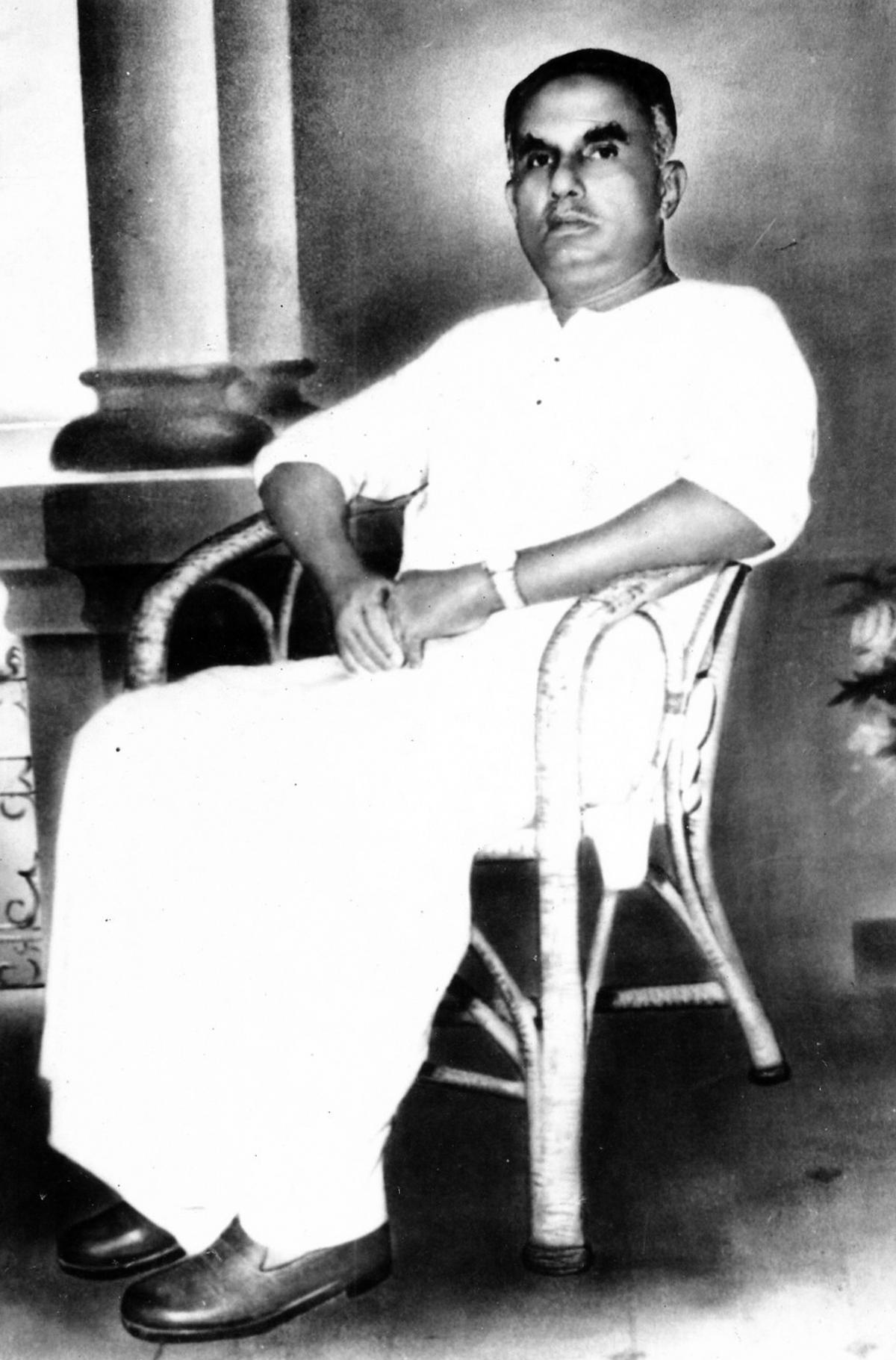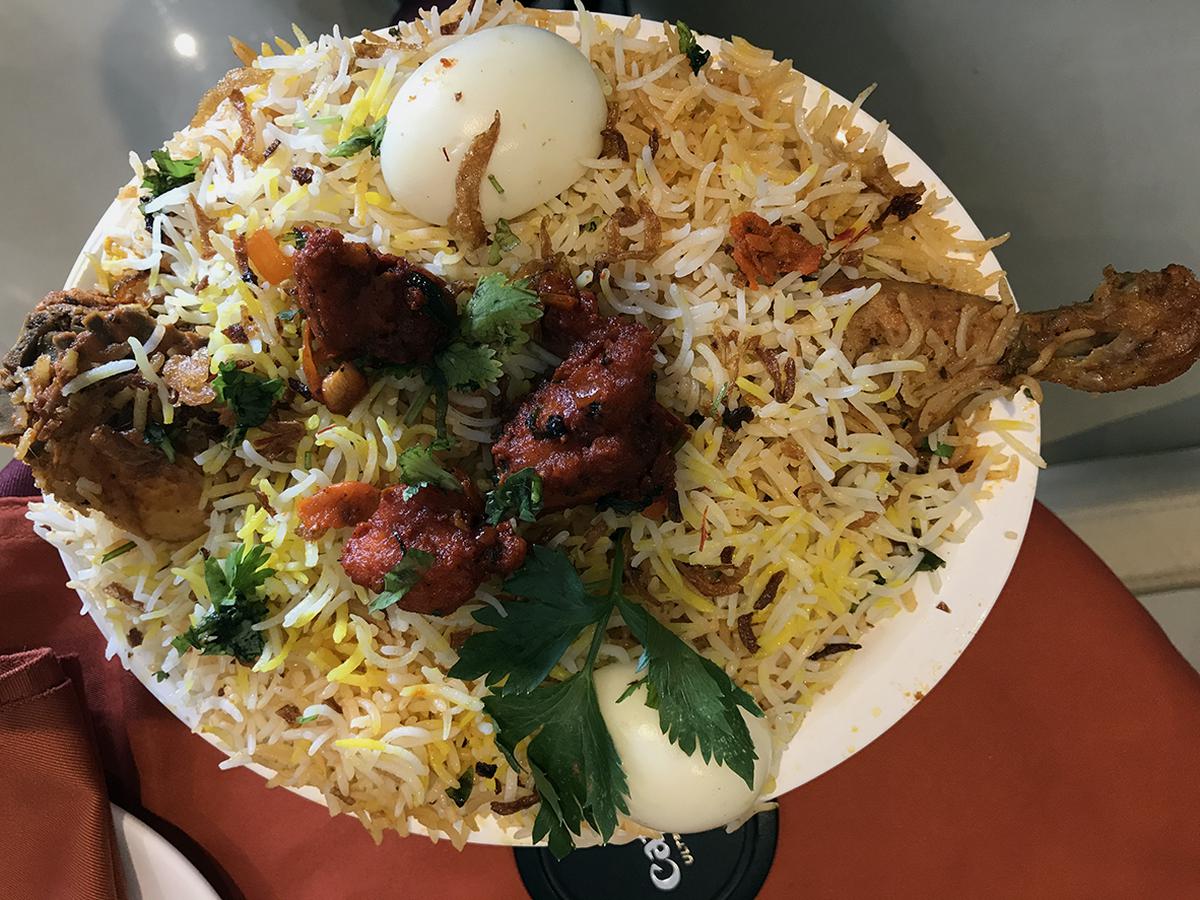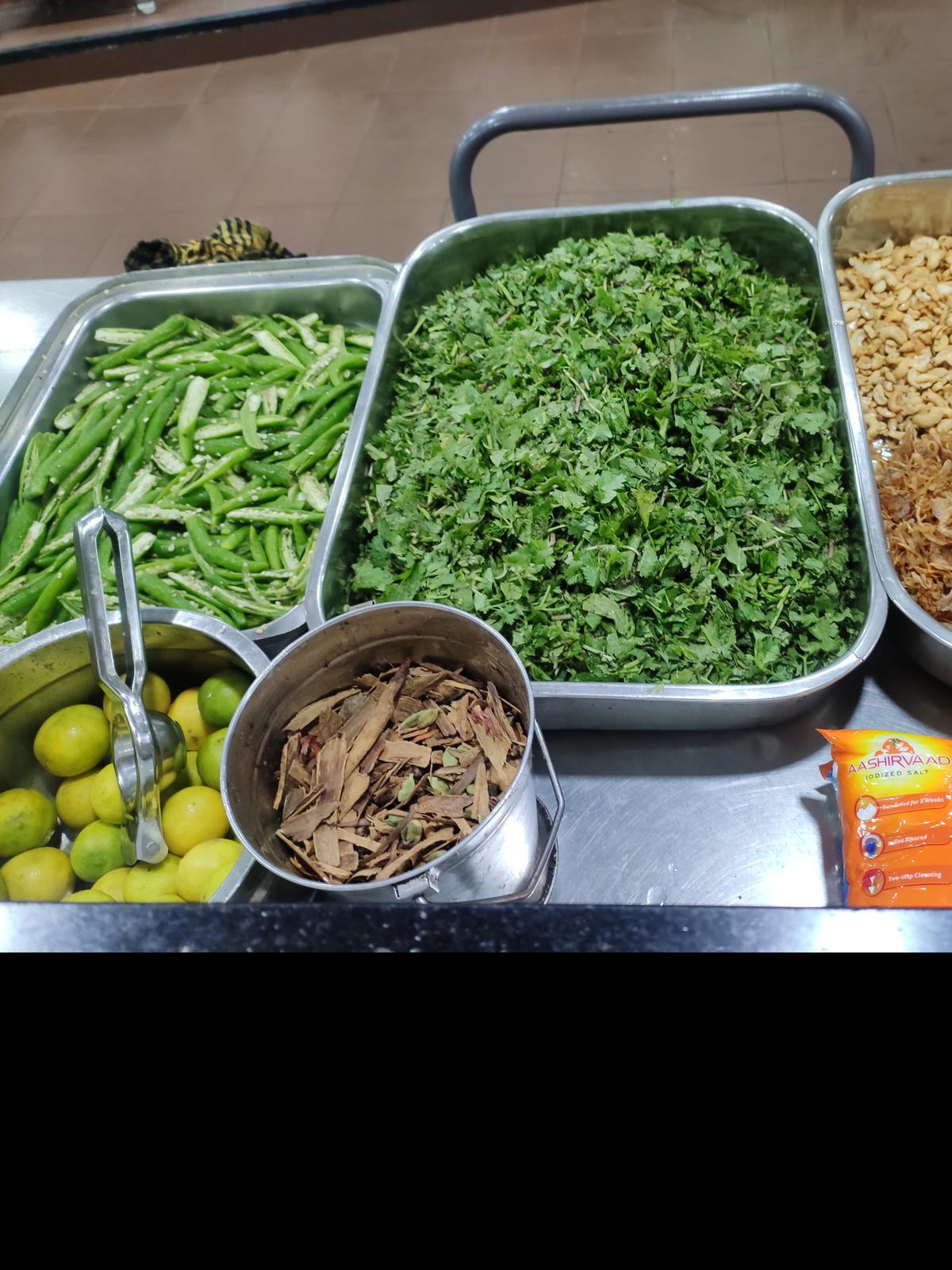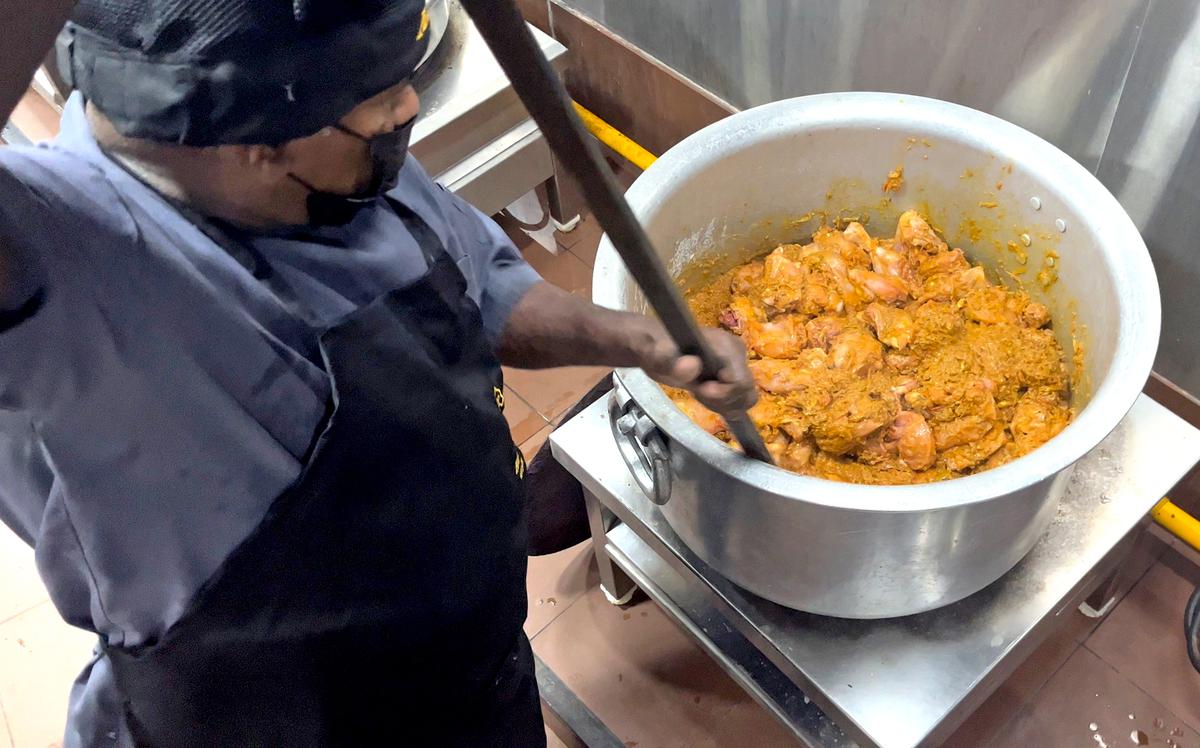Golden yellow mutton biryani, made with long-grained fragrant rice, lightly spiced with cloves, cinnamon, bay leaves, ginger, garlic and more, rich with pieces of tender mutton cooked just right, and garnished with fried cashew nuts, plump raisins, coriander and mint leaves, is a perennial favourite of residents in Thiruvananthapuram. Right in the middle of the biryani would be a boiled egg.
Served with a not-too-sour raita of finely sliced onion, tomato and green chilli, coconut chutney, lime pickle or date pickle and lots of pappadam, the aromatic biryani, cooked with generous dollops of ghee or coconut oil, would disappear in minutes. This was the biryani that used to be served in most upmarket and small restaurants, and eateries in erstwhile Travancore, which included places such as Nagercoil, Thiruvananthapuram, Kollam Alappuzha, and Kottayam. The culinary tradition continued even after Trivandrum became Thiruvananthapuram.
So, for many who grew up in Thiruvananthapuram before the noughties, this was the aromatic biryani that whetted their appetite for more biryani. Over the last decade, there has been a profusion of restaurants serving versions of Thalassery and Malabar biryani cooked with small-grained kaima rice or jeerakashala rice. Well-known restaurants and popular eateries in Thiruvananthapuram switched to this rice for biryani. And the dish was no longer the same for gourmets.
Popular demand
Many caterers and chefs abandoned the flavourful grains of Basmati for the small-grained rice at weddings and functions. Suffice to say that there were many who hankered for the taste of the ‘real biryani’, which was brought to Thiruvananthapuram mainly by Dakhani Urdu-speaking Muslims who came to serve in the cavalry of the Travancore army, the administration and the judiciary. They settled in the city and many residents were first introduced to this version of the biryani.

MP Azad, founder of Azad Hotel in Thiruvananthapuram.
| Photo Credit:
Special arrangement
Many of them came from places in Tamil Nadu and Hyderabad and settled at different places in Travancore. Chand Begum, whose ancestor Murtaza Khan Saab came to Travancore during the reign of Marthanda Varma, says even today they cook biryani with Basmati.
“My amma used to cook it in the open on a firewood stove. The mutton and the rice were cooked separately and when they were three-fourths done, the rice, usually Basmati, was put into the vessel with the mutton. Then the fire in the stove would be reduced and coals would be kept on a lid used for covering the vessel in which the biryani was being cooked. It was all a matter of timing.”

Flavourful biryani.
| Photo Credit:
Serish Nanisetti
One of the few restaurants that still serve the biryani made with long-grained rice is the 83-year-old Azad Hotel in the city. It was established by MP Azad, a trader, in 1940. It was perhaps the first to serve non-vegetarian food in Thiruvananthapuram and their mutton biriyani became the gold standard on to compare other biryani.
The Travancore biryani
Meeran Pilla Pareed Kunju was such a great admirer of freedom fighter and Congress leader Maulana Abdul Kalam Azad that he came to be known as Azad among his friends. Wazim explains that when his grandfather opened an outlet that sold non-vegetarian food, it used to be called Azadinte kada (Azad’s shop). Finally, he decided to call it Azad Hotel. “He first opened a small makeshift outlet near Vallakadavu. Our first restaurant was at Overbridge. Right from those days, we sold only mutton and chicken as my grandfather wanted assure his customers that only the best was sold at his hotel.”
At their central kitchen at Eenchakkal, there is a separate category called 1940’s, which includes dishes such as mutton chops, liver fry, mutton etc. , which have been a constant on their menu from 1940.
Wazim Azad, grandson of MP Azad, says their grandfather had to do a lot of travelling to places such as Mumbai and Hyderabad and he may have been inspired by the biryani he had had there. “In those places, biryani is almost always made with long grain rice such as Basmati. Perhaps, that is why our biryani has always been made with Basmati. We have retained the same recipe that was followed eight decades ago. However, we stopped using raisins and pieces of pineapple in our biriyani. That is the only difference,” says Wazim.

Some of the ingredients used in the Travancore biryani made at Azad.
| Photo Credit:
Sreejith R Kumar
Even for marriage and other functions, the biryani from Azad includes their signature date pickle, raita, boiled egg and pappadam. “In the forties and fifties, desserts as such were not common. We always used to serve fresh slices of pineapple, which aids digestion and served as a dessert too,” adds Wazim.
Flavours of the Deccan
Historian and author Manu Pillai says some of the Dakhani Urdu-speaking Muslims came as a result of Travancore’s political connection to the Nawab of Arcot. “It was the Nawab to whom they paid tribute (the Nawab representing the Mughal emperor) and the Nawab also confirmed successions in the royal family. Part of the titles used by the Maharajahs of Travancore down till 1949 were bestowed by the Nawabs. There were some Muslims sent from the Nawab’s court who were part of the Travancore court and its military processions,” writes Manu in an email.
In fact, many of them served as bodyguards of the monarch, says history buff and conservation architect Sharat Sunder Rajeev. There was a Muslim community just outside the Fort precincts in Thiruvananthapuram since the time of Kottayam Kerala Varma in the 17th century. “Ballads and local lore talk about a Muslim bodyguard who was killed when Kottayam Kerala Varma was assassinated in 1696. So, quite possibly, these communities may have introduced the biryani to Travancore,” says Sharat.
Echoing his opinion, restauranteer and home chef Nabila Shanawas, says the biryani cooked by her Umma (mother) was always with long grain rice, and had bits of pineapple in it. Food colour was added to small portions of the rice. Nabila, whose parents hail from Alamcode, near Attingal in Thiruvananthapuram, and Alappuzha cannot remember when biryani was ever made at their home with anything other than long-grained rice.

A cook mixing the masala and pieces of chicken at the central kitchen of Azad Hotel in Thiruvananthapuram.
| Photo Credit:
Sreejith R Kumar
Chef and restauranteer Suresh Pillai explains that the fad for kaima and jeerakashala rice is a recent phenomenon in Southern Kerala. “In most places in southern Kerala, biryani was only made with long grain rice. It is only in the last 10 years or so that biryani with kaima or jeerakashala rice, mainly used in the Malabar region, began to be popularised in places such as Thiruvananthapuram, Kollam and Kottayam,“ he says.
He says that to cater to popular taste, Malabar nikah biryani, which is made in his restaurant, is made with kaima rice. “But I also make biryani with Basmati. In fact, for mutton biryani, I prefer Basmati to the small-grained rice.”
Chef Suresh Pillai
| Photo Credit:
Special arrangement
Wazim says it could be a matter of taste but many in Southern Kerala still long for the taste of the Basmati biryani and its sides of egg, pappadam and pickle. He adds that it is the same biryani that is made in a sister branch of Azad at Nagercoil in Tamil Nadu, which is run by members of the extended family. “Once the half-cooked rice is added to the half-cooked mutton or chicken, the vessel is sealed shut and cooked in the dum style. Coal is spread on a plate on the top of the vessel while it is still on a low flame on the stove. The flavours of the meat, the spices and the rice get infused in every bit of the biryani,” he says.
Recently, the Azad group of restaurants branded their biriyani as Azad Pukka Travancore Biriyani. “This is a brand itself in Kerala and since we have continued the culinary tradition of following the same recipe for 80 years, we decided to market it as such.”
He says with a laugh that many make a beeline to Azad for the taste of nostalgia and to feast on biryani.

